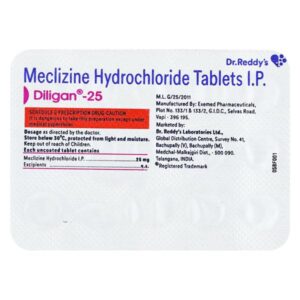NICOTINIC ACID + MECLIZINE
Nicotinic Acid: Nicotinic Acid, also known as niacin or vitamin B3, is a drug used for the treatment of high cholesterol and triglyceride levels. It is available both over the counter and as a prescription medication.
Nicotinic Acid works by decreasing the production of certain types of fats in the body, including cholesterol and triglycerides. It does this by inhibiting the release of free fatty acids from adipose tissue, which reduces their availability for synthesis and storage by the liver.
The usual starting dose of Nicotinic Acid for the treatment of high cholesterol is 500 mg to 1000 mg taken orally once daily, usually at bedtime. The dose may be titrated upwards as necessary, under the guidance of a healthcare professional, to achieve the desired lipid-lowering effects. However, it is important to follow the prescribed dosage instructions carefully.
Like all medications, Nicotinic Acid can cause side effects. The most common side effect is flushing, which results in warmth, redness, itching, and a tingling sensation on the skin. This flushing can be minimized by taking the medication with meals or using an extended-release formulation. Other less common side effects include liver toxicity, gastrointestinal upset (such as nausea, vomiting, and diarrhea), and increased blood sugar levels. If any of these side effects become severe or persistent, it is important to consult a healthcare professional.
In conclusion, Nicotinic Acid is a drug used for the treatment of high cholesterol and triglyceride levels. It works by reducing the production of cholesterol and triglycerides in the body. It should be taken according to the prescribed dosage instructions and can cause side effects, including flushing, liver toxicity, gastrointestinal upset, and increased blood sugar levels. It is important to consult a healthcare professional if any side effects occur or if there are any concerns about its use.
Meclizine: Meclizine is a medication that is primarily used to treat and prevent nausea, vomiting, and dizziness associated with motion sickness. It belongs to a group of drugs known as antihistamines.
The exact mechanism of action of meclizine is not fully understood. However, it is believed to exert its effects by blocking the action of histamine, a chemical that is involved in the body’s response to allergic reactions. By blocking histamine, meclizine reduces certain symptoms such as nausea and dizziness.
Meclizine is typically taken orally, with or without food. The usual recommended dose for adults is 25 to 50 milligrams once daily, either as a single dose or divided into smaller doses throughout the day. It is important to follow the instructions provided by the doctor or pharmacist regarding the appropriate dose for each individual, as it can vary depending on the specific condition being treated.
As with any medication, meclizine can cause certain side effects. Common side effects may include drowsiness, dry mouth, blurred vision, and constipation. These side effects are usually mild and go away on their own. However, if they persist or worsen, it is advisable to consult a healthcare professional.
Less common but potentially serious side effects may include irregular heartbeat, difficulty urinating, and allergic reactions such as rash, itching, or swelling. In such cases, immediate medical attention should be sought.
It is worth noting that meclizine can enhance the sedative effects of other medications or substances that cause drowsiness, such as alcohol or certain tranquilizers. Therefore, it is important to exercise caution and avoid driving or operating machinery while taking this medication.
Before taking meclizine, it is important to inform the healthcare provider about any existing medical conditions or allergies, as well as any other medications or supplements being taken. This will help to ensure the safe and effective use of the drug.

